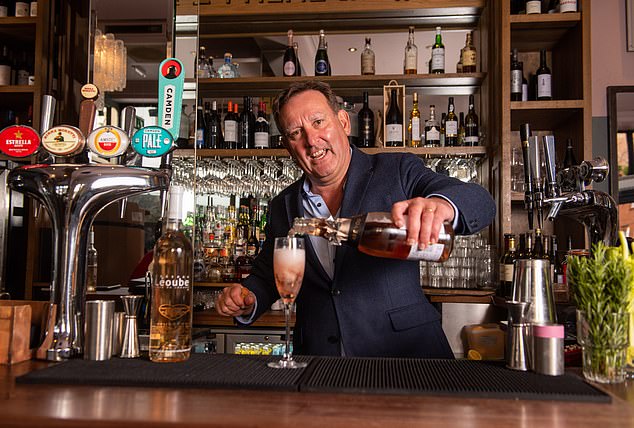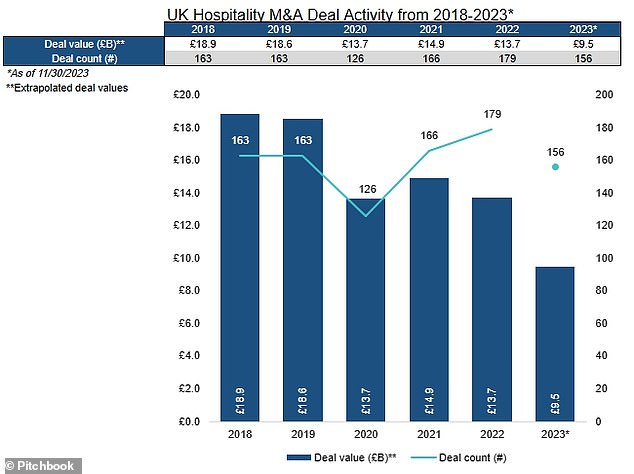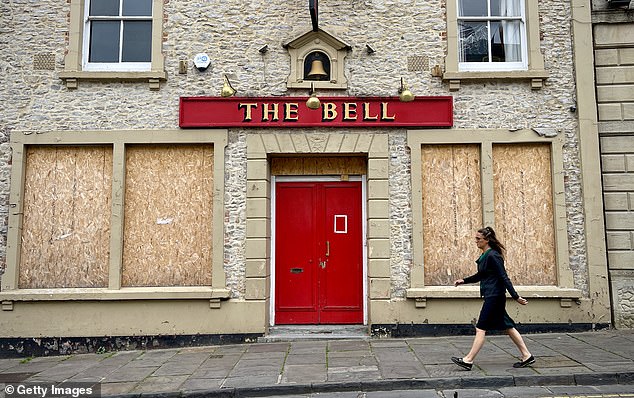Analysts eye more M&A for Britain’s hospitality sector
The landscape of the UK hospitality sector is changing rapidly just as the country's overburdened pubs, restaurants and hotels head into their busiest time of year.
In the past seven weeks alone, two well-known hospitality companies have accepted takeover bids and analysts believe this could be the start of a period of significant consolidation for the sector.
Wagamama's parent company, The Restaurant Group (TRG), agreed a £506 million takeover by private equity giant Apollo Global Management in mid-October.
A month later, serial entrepreneur Clive Watson scored another big profit by selling City Pub Group to pub chain Young's in a £162 million deal.
The deals come against a very challenging backdrop for the UK hospitality sector, which is still struggling to recover from the Covid-19 pandemic due to cost of living pressures and labor shortages.
According to real estate services provider Altus Group, almost as many cafes closed permanently in the first half of this year as in all of 2022.
Cheers everyone!: Analysts have observed an increase in mergers and acquisitions involving hospitality companies in recent months
Figures from accountancy firm Price Bailey also show that restaurants closed the fastest in ten years between January and the end of March.
And the British nightclub scene has continued to shrink, with 12 percent of venues closing in the year ending in June, says CGA Nielson.
The number of corporate bankruptcies has not yet led to substantial takeover activity, but this is largely due to the overall weakness of M&A activity globally as high interest rates increase economic uncertainty and financing costs.
However, analysts have seen an increase in takeover activity in recent months, including large-scale transactions such as the purchases of TRG and Young.
In another major deal, Gail's Bakery owner McWin bought a majority stake in Italian restaurant chain Big Mamma, valuing the latter at €270 million.
Graeme Smith, managing director at consultancy AlixPartners, says the recovery in mergers and acquisitions represents a “market catch-up” after successive shocks such as the pandemic, the war in Ukraine and the spike in debt levels.
“These events and that disruption have likely led to a delay in some transactions,” he told This is Money.
He also believes the number of deals reflects the hospitality industry's impressive ability to weather significant headwinds.
Smith said: 'Customers have continued to protect their food and drink spend, and businesses have managed to implement price increases to offset some of the supply price increases they have had due to the inflationary environment.
'We strive for a more stable market environment with a resilient consumer. And I think this gives (investors) confidence to do mergers and acquisitions.”

Drink up: Serial entrepreneur Clive Watson scored another big payday last month by selling City Pub Group to pub chain Young's in a £162 million deal
While the number of mergers and acquisitions involving hospitality companies has not fallen dramatically, the average size of deals has been much smaller.
Financial data provider Pitchbook estimates that the value of takeovers and takeovers in the UK hospitality sector between January and November 2023 was equivalent to £9.5 billion, compared to £13.7 billion for all of last year, while none of the ten largest deals since 2018 took place this year. .
It may come as no surprise that brokers and shareholders are concerned that companies are being snapped up too cheaply.
On Apollo's proposed purchase of TRG, Tim Barrett of broker Numis said the offer was 'relatively low for assets of this quality', and activist investor TMR Capital said the offer would have to be at least £100m higher.
The price tags partly reflect how cheap London-listed shares have become compared to other leading cities, especially New York.
On the other hand, Richard Hunter, head of markets at Interactive Investor, says Britain's “notoriously undervalued” shares make them potentially attractive takeover targets.
He added: 'With valuations in both the hospitality and retail sectors capped due to caution about the prospects for the increasingly stressed UK consumer, the possibility of further mergers and acquisitions is not difficult to envisage. provided.'
M&A volumes could get a significant boost if, barring another unfortunate global shock, inflation continues its downward trajectory and central banks cut key interest rates as forecast.

Lower valuations: While the volume of mergers and acquisitions involving hospitality companies hasn't fallen much this year, the average deal was much smaller
Monetary easing often stimulates dealmaking by lowering the risk of leveraged takeovers and attracting more capital to the private equity sector.
Acquisitions in the hospitality sector took off as interest rates remained at record lows shortly after Covid-related lockdown restrictions began to ease and the UK economy recovered with confidence.
These animal spirits are now returning as companies show more optimism, with falling energy costs putting less pressure on margins and sales growth defying the gloomy macroeconomic outlook.
Graeme Smith believes larger hospitality operators are likely to continue buying up smaller groups, as they have done in recent years.
He points to pub giant Greene King acquiring barbecue smokehouse brand Hickorys and Cafe Rouge owner Big Table Group buying pan-Asian restaurant chain Banana Tree last year.
Many modestly sized companies see acquisitions as the best way to accelerate their expansion because their new parent company has deeper capital resources and greater economies of scale.
For example, when Japanese conglomerate Toridoll agreed to buy Fulham Shore, it announced a partnership with private equity house Capdesia to finance the future growth of Franca Manca's owner.
“There is consistent and ongoing investment in smaller companies with a lot of white space,” says Smith.
“I think we'll continue to see companies that have the potential to roll out across channels. Whether it's with franchise partners, whether it's abroad, those companies with multiple growth channels will remain attractive and targeted by investors.”

Latest orders: Britain now has fewer than 100,000 licensed locations, according to the CGA
Small and independent groups could also see a takeover by a larger institution as an escape route from the Covid-19-induced problems that have disproportionately affected them.
Research by the CGA calculated that the The number of catering establishments fell by almost 15,000 between March 2020 and June 2023of which more than three quarters are independent operators.
In contrast, the number of managed sites fell by just 3.7 percent over the same period.
More recent figures from the organization show that Britain now has fewer than 100,000 licensed locations for the first time ever.
That number will continue to fall, predicts Derren Nathan, head of equity research at investment platform Hargreaves Lansdown.
'The entire supply is still disappearing from the market, and smaller players are really suffering from this. This will be a case of survival of the fittest.”
But Nathan says that instead of major acquisitions, companies can “get more value” by snapping up new sites when the properties come up for sale.
JD Wetherspoon and Mitchells & Butlers are following this route, as is Whitbread, which is scouting sites it can convert into Premier Inn hotels.
At the same time, bar group Nightcap, co-founded by former Dragons Den star Sarah Willingham, is capitalizing on the depressed commercial property market to open new venues on more favorable financial terms.
But Nightcap also sometimes pursues acquisitions, most recently taking over cocktail bar chain Dirty Martini and brasserie Tuttons in Covent Garden in a £4.65m pre-pack deal.
Such deals show that demand for buyouts has remained, even within the current economic climate.
Considering that inflation has fallen so much and interest rates are easing, the hospitality sector could be about to witness a boom in mergers and acquisitions.
Some links in this article may be affiliate links. If you click on it, we may earn a small commission. That helps us fund This Is Money and keep it free to use. We do not write articles to promote products. We do not allow a commercial relationship to compromise our editorial independence.

